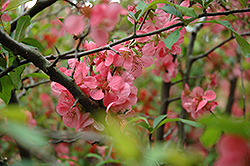It's all about ...
plants

Nivalis Flowering Quince
Chaenomeles speciosa 'Nivalis'
Height: 10 feet
Spread: 15 feet
Sunlight:
![]()
![]()
Hardiness Zone: 6a
Other Names: White Flowering Quince
Description:
This upright shrub features stunning pure white flowers in early spring; however, limited ornamental attributes the rest of the season, needs regular pruning to keep it looking respectable
Ornamental Features
Nivalis Flowering Quince is covered in stunning white cup-shaped flowers along the branches in early spring before the leaves. It has dark green deciduous foliage which emerges coppery-bronze in spring. The glossy oval leaves do not develop any appreciable fall colour. The fruits are showy yellow pomes displayed in mid fall. The fruit can be messy if allowed to drop on the lawn or walkways, and may require occasional clean-up.
This plant is primarily grown as an ornamental, but it's also valued for its edible qualities. The bitter fruit is most often used in the following ways:
- Preserves
Landscape Attributes
Nivalis Flowering Quince is a dense multi-stemmed deciduous shrub with an upright spreading habit of growth. Its average texture blends into the landscape, but can be balanced by one or two finer or coarser trees or shrubs for an effective composition.
This is a high maintenance shrub that will require regular care and upkeep, and should only be pruned after flowering to avoid removing any of the current season's flowers. Gardeners should be aware of the following characteristic(s) that may warrant special consideration;
- Messy
- Spiny
Nivalis Flowering Quince is recommended for the following landscape applications;
- Mass Planting
- Hedges/Screening
- General Garden Use
Planting & Growing
Nivalis Flowering Quince will grow to be about 10 feet tall at maturity, with a spread of 15 feet. It tends to fill out right to the ground and therefore doesn't necessarily require facer plants in front, and is suitable for planting under power lines. It grows at a medium rate, and under ideal conditions can be expected to live for 40 years or more.
This shrub does best in full sun to partial shade. It is very adaptable to both dry and moist locations, and should do just fine under average home landscape conditions. It is not particular as to soil type or pH. It is highly tolerant of urban pollution and will even thrive in inner city environments. This is a selected variety of a species not originally from North America.
This plant is not reliably hardy in our region, and certain restrictions may apply; contact the store for more information.
